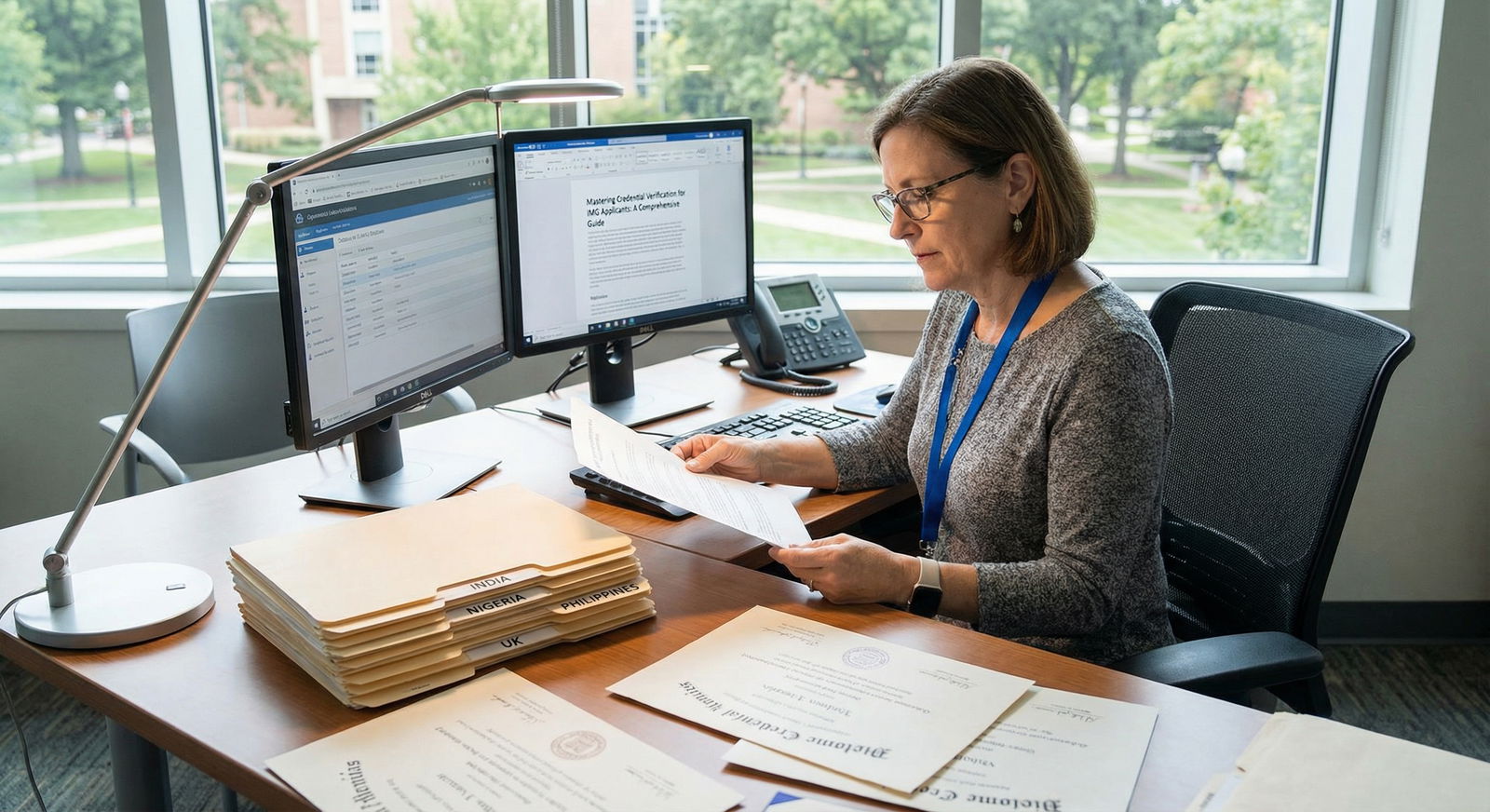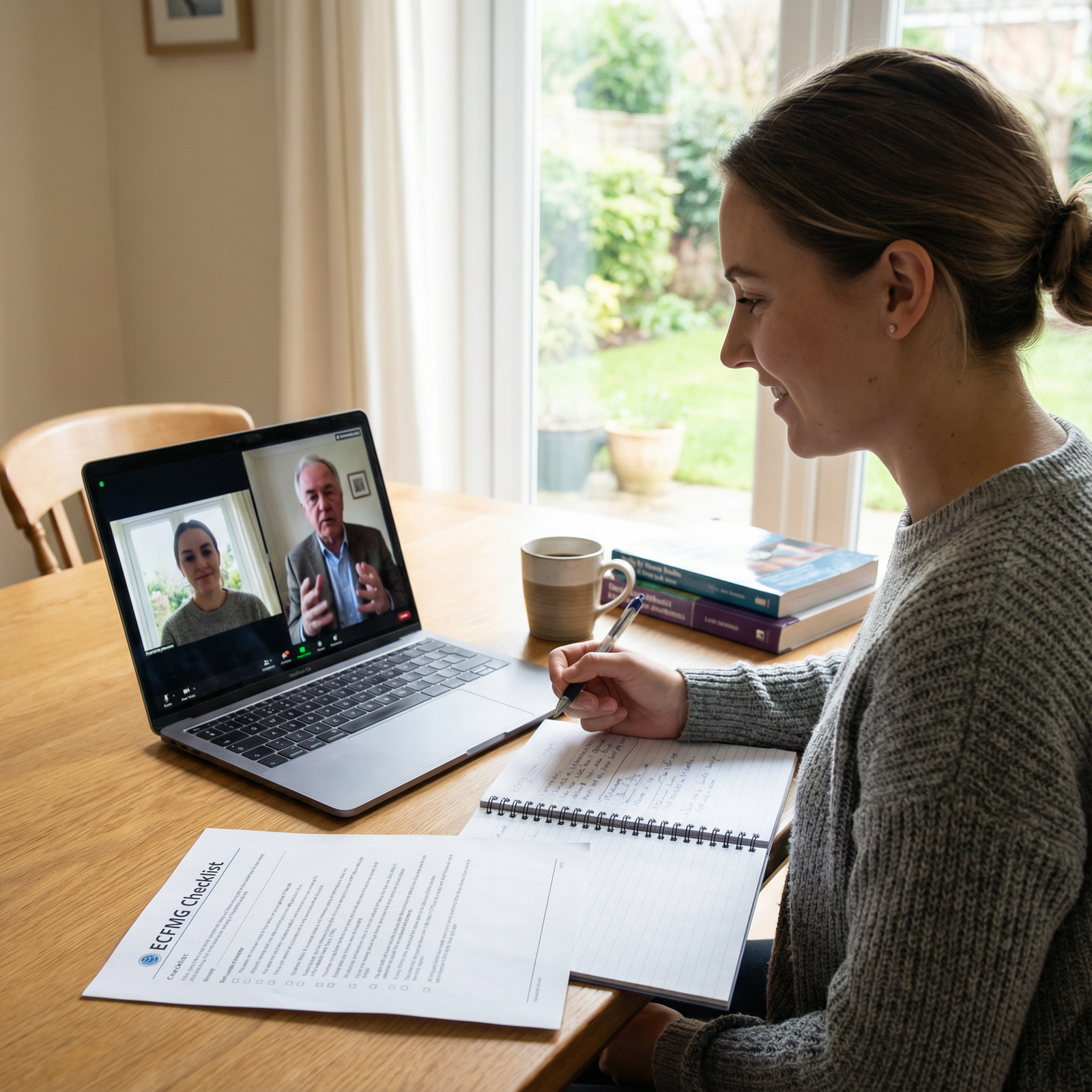
Understanding Credential Verification Challenges for IMG Applicants
Navigating the U.S. residency pathway as an International Medical Graduate (IMG) involves far more than strong exam scores and compelling personal statements. One of the most critical and often underestimated components of the process is credential verification. For many IMG applicants, delays or problems in this area can derail an otherwise competitive residency application.
This guide explains how credential verification works, why it is so important for IMG applicants, what common issues arise, and—most importantly—how to prevent and address these problems proactively. Whether you are still in medical school abroad or already in the middle of your residency application, understanding these steps can help you protect your timeline and maximize your chances in the Match.
Why Credential Verification Matters for IMGs
Credential verification is the quality-control backbone of the U.S. system for medical residency and licensure. For IMG applicants, it is the bridge between your medical education abroad and eligibility to practice in the United States.
Role of ECFMG in IMG Credential Verification
The Educational Commission for Foreign Medical Graduates (ECFMG) is the primary organization responsible for verifying the credentials of IMGs seeking training in U.S. graduate medical education. Before you can start most ACGME-accredited residency programs, you must obtain ECFMG Certification, which confirms that:
- Your medical school meets recognized standards
- Your degree and transcripts are genuine and issued by your school
- You have met examination and other certification requirements
Credential verification by ECFMG typically includes:
Primary Source Verification (PSV)
ECFMG contacts your medical school (or its designated authority) directly to confirm:- Your enrollment and graduation
- Your degree title and issue date
- Your academic status (good standing, leave of absence, dismissal, etc., when applicable)
Document Review
ECFMG evaluates:- Diplomas and medical degrees
- Final medical school transcripts
- School certificates (e.g., internship completion, if required by your country)
- Name change documents (marriage certificate, court order, etc., if names differ)
Translation and Formatting Requirements
Any documents not in English must be:- Translated using approved or certified translation processes
- Submitted in the exact format and manner ECFMG specifies (sealed envelopes, official stamps, electronic uploads via designated portals, etc.)
This multi-step process protects patients, residency programs, and the U.S. medical system by ensuring that every IMG applicant’s training is real, properly completed, and equivalent to acceptable standards.
Why Smooth Credential Verification Is Essential for Residency
Delays or failures in credential verification can have concrete consequences:
Inability to Register for USMLE Steps (at earlier stages)
Some IMGs cannot progress with Step exams if ECFMG cannot verify certain school details.ECFMG Certification Delays
Without timely certification, you may:- Be unable to start residency, even if you have matched
- Face last-minute scrambling with program directors and GME offices
- Potentially lose your position if credentialing problems cannot be resolved by program start dates
Compromised Match Timeline
If your documentation is still under verification:- Some programs may be hesitant to rank you highly
- State medical boards may delay institutional permits or training licenses
For IMG applicants, credential verification is not just administrative—it is strategically central to your residency journey.
Common Credential Verification Problems for IMG Applicants
Understanding the most frequent issues helps you anticipate and prevent them. Below are major categories of challenges faced by many IMGs.

1. Medical School Accreditation and Recognition Issues
Not every medical school is treated equally in the eyes of ECFMG and U.S. residency programs.
Key concerns include:
Lack of Recognized Accreditation
- ECFMG increasingly aligns with WFME (World Federation for Medical Education)-recognized accreditation agencies.
- Schools that are not accredited by a recognized authority may create serious obstacles for credential verification and future eligibility.
Changes in School Status
- Loss of accreditation
- Newly established schools in the process of seeking accreditation
- Political changes or regulatory shakeups in the home country
Example Scenario
An IMG graduated from a school that recently lost its recognized accreditation. When ECFMG reviews the application, the school’s status triggers an additional review, extending verification time by several months. The applicant ultimately struggles to receive certification in time for residency start dates.
2. Documentation Inconsistencies and Anomalies
Even if your medical school is recognized, discrepancies in documents can halt verification. Common problems include:
- Spelling differences or name mismatches:
- Different order of names
- Missing middle names
- Use of nicknames vs. legal names
- Graduation date discrepancies:
- Date on diploma vs. date in transcripts vs. date school confirms
- Degree title variations:
- MBBS vs. MD vs. “Physician Diploma” in local language
- Missing pages or incomplete transcripts
- Differences between documents you upload and what the school sends ECFMG
These “small” inconsistencies can raise concerns about document authenticity, leading to repeated requests, delays, or even formal investigations.
3. Long and Unpredictable Verification Timelines
Credential verification timelines often stretch longer than applicants anticipate, especially when:
- Medical schools:
- Are slow to respond to ECFMG
- Have limited administrative staff
- Close during holidays, strikes, or political unrest
- International mail or courier services are slow or unreliable
- There are backlogs at verification offices or central universities
This can be particularly problematic if you start the process late in your medical education or too close to your intended Match cycle.
4. Language Barriers and Translation Problems
For IMGs, many critical documents are initially generated in languages other than English. Common issues include:
- Non-certified translations that ECFMG cannot accept
- Translators who are unfamiliar with medical or academic terms, leading to:
- Inaccurate degree titles
- Misinterpreted course names
- Inconsistency between original and translated versions (e.g., date formats, abbreviations)
- Missing translator credentials or required certification statements
When translation quality is poor, ECFMG may request re-translation, causing further delays.
5. Flags Related to Fraud or Document Authenticity
ECFMG and related agencies are tasked with detecting fraudulent or altered documents. While this is important to protect the profession, it can create collateral stress for genuine applicants if:
- Your school is in a region with a history of document fraud
- Your documents show unusual fonts, stamps, or seals compared to prior students
- There are visible corrections, overwriting, or mismatched signatures
In such cases, ECFMG may label your file for enhanced review, requiring additional confirmations or documentation. This does not mean you have done anything wrong—but it will extend processing time and require extra diligence on your part.
Proactive Strategies to Prevent Credential Verification Problems
For IMG applicants, the best “solution” is often prevention. With planning and attention to detail, you can significantly reduce the chance of last-minute crises.
1. Verify Medical School Status Early and Repeatedly
Even if you are still a pre-med or early in medical school, checking your school’s standing is crucial.
Actions you can take:
- Confirm that your school appears in World Directory of Medical Schools (WDOMS)
- Ensure that the ECFMG “sponsor note” is present and that your graduation year is covered.
- Monitor announcements from:
- WFME-recognized accreditation bodies
- Your school’s administration
- ECFMG updates about acceptable medical schools or accreditation requirements
If your school’s status seems uncertain, seek clarification from:
- Your dean’s office or registrar
- National accreditation authorities
- Current or recent graduates who have gone through ECFMG
2. Start Document Preparation Well Before Applying for Residency
Do not wait until the ERAS season to think about documentation. Instead:
- As early as final year of medical school (or sooner):
- Request sample copies or unofficial previews of your diploma and transcript (if allowed).
- Ask your administration who is responsible for handling ECFMG requests and obtain their correct contact information.
- Immediately after graduation:
- Request multiple official copies of:
- Your diploma
- Your full transcripts
- Any required internship/house job completion certificates
- Keep at least one sealed copy for future verification needs.
- Request multiple official copies of:
Organize digital and physical copies carefully:
- Scan all documents in high resolution
- Label files clearly (e.g., “Surname_Firstname_MD_Diploma_OfficialScan.pdf”)
- Back up to multiple secure locations (cloud + external drive)
3. Ensure Absolute Consistency in Personal Data
Administrative consistency is vital for smooth credential verification.
Double-check that:
- Your name appears exactly the same on:
- Passport
- Medical diploma and transcript
- USMLE/ECFMG registration
- ERAS application
- Date formats are consistent and unambiguous (e.g., use “01 Jan 2024” instead of “01/01/24” where possible)
- If you changed your name:
- Gather all legal documentation (marriage certificate, court documents)
- Inform your medical school so they can note the change in their records
Include explanations where needed. Some IMGs add a brief clarification in their ERAS application if they have multiple name variants, then ensure supporting documents are uploaded.
4. Use Professional, Certified Translation Services
For non-English documents, invest in high-quality, certified translations that comply with ECFMG and state medical board requirements.
Best practices:
- Choose translators who:
- Have experience with academic and medical documents
- Provide a signed translator’s statement or affidavit
- Clearly indicate original language, translation date, and their credentials
- Request that the translator:
- Maintain original formatting as much as possible
- Use consistent terminology across all documents
- Carefully compare originals and translations:
- Check names, dates, degree titles, course names
- Ensure no information is omitted
If your school has a recommended translation service that prior graduates successfully used for ECFMG, consider starting there.
5. Build and Maintain Close Communication With Your Medical School
Your medical school plays a central role in primary source verification. A good relationship with key administrators can make or break your timeline.
Steps to take:
- Identify the exact office or person responsible for responding to ECFMG (often the registrar, academic affairs, or dean’s office).
- Ask:
- How they handle ECFMG forms or electronic portals
- Average response times
- Contact methods they prefer (email, phone, official letters)
- Keep their contact details updated in your ECFMG account if applicable.
When ECFMG sends verification requests:
- Politely inform your school and confirm receipt of the request.
- Ask when they expect to send the response.
- Follow up periodically, especially if deadlines are approaching.
Always communicate professionally and respectfully—many administrators handle large volumes of requests and may prioritize those who are clear and courteous.
6. Track Timelines and Build Buffer Periods
IMG applicants often underestimate how long credential verification can take.
Practical timeline planning:
- Begin the credential verification process at least 6–12 months before your intended Match cycle (and earlier if your school’s responsiveness is historically slow).
- Set personal “internal deadlines” that are earlier than official ones.
For example:- Aim to have ECFMG certification complete several months before residency start, not just by the last permissible date.
- Use a simple tracking system (spreadsheet or task manager) for:
- Documents already submitted
- Pending verifications
- Follow-up dates with your school and ECFMG
What to Do When Credential Verification Problems Arise
Even with excellent preparation, some IMG applicants will encounter problems. The key is to respond quickly and systematically, rather than ignoring or hoping the issue resolves on its own.

1. Clarify the Exact Nature of the Problem
First, identify where the breakdown occurred:
- Is it at ECFMG (e.g., pending review, flagged documents)?
- Is it at your medical school (e.g., no response to verification requests)?
- Is it related to translation, missing pages, or data inconsistencies?
Actions:
- Log into your ECFMG and ERAS accounts regularly to check status updates.
- Read any ECFMG communications closely—emails and letters are often very specific about the problem.
- If needed, call ECFMG directly for clarification, noting:
- Name of the representative
- Date and time
- Summary of advice given
2. Coordinate With Your Medical School Promptly
If ECFMG has contacted your medical school but no response has been received:
- Send a polite email to the appropriate administrator:
- Include your full name, date of birth, graduation year, and ECFMG ID.
- Attach or reference ECFMG’s request if you have it.
- If email is ineffective:
- Try phone calls during local working hours.
- Consider visiting in person if you are still in the country.
- Ask whether they:
- Received the ECFMG request
- Have any questions about how to respond
Sometimes, simply making the school aware of the importance of this step for your residency timeline prompts faster action.
3. Correct Documentation Errors Quickly and Transparently
If ECFMG notes inconsistencies or missing information:
- Gather all relevant original documents.
- Create a concise explanation of:
- Why the discrepancy exists (e.g., old passport vs. new passport name)
- How your current name or data should be correctly listed
- Provide supporting evidence:
- Legal name change documents
- Letters from your medical school clarifying error in issue date or spelling
Avoid altering documents yourself in any way (no handwriting corrections, no additional stamps added by anyone other than authorized officials). Any appearance of tampering can trigger fraud concerns.
4. Seek Professional Guidance and Peer Support
You do not have to navigate complex credential verification issues alone.
Helpful resources:
- Faculty advisors or mentors within your specialty of interest
- Senior IMGs who have recently completed the verification process
- Professional organizations and IMG societies
- Reputable consulting services specializing in IMG residency pathways (exercise caution and verify their track record)
These sources can help you interpret confusing messages from ECFMG, outline the best next steps, and offer realistic expectations for resolution timelines.
5. Understand and Use Appeal or Reconsideration Processes
In rare cases, credential verification leads to an unfavorable decision or prolonged unresolved status.
If that happens:
- Review ECFMG’s official policies on appeals or reconsideration.
- Prepare:
- A clear, factual body of evidence
- Supporting documents from your medical school or national authorities
- Professional translations, if needed
- Submit within all stated deadlines and keep copies of everything you send.
While success is not guaranteed, a well-organized appeal demonstrating transparency and valid documentation can sometimes overturn or clarify problematic decisions.
Frequently Asked Questions About Credential Verification for IMGs
1. What exactly is credential verification for IMG applicants?
Credential verification is the formal process through which organizations like ECFMG confirm that:
- You graduated from a recognized medical school
- Your medical degree and transcripts are authentic
- Your identity and personal details match your documentation
It is a necessary step for ECFMG Certification, eligibility for medical residency positions, and eventually state licensure in the U.S.
2. How long does ECFMG credential verification usually take?
Timelines vary widely. Factors include your medical school’s responsiveness, document completeness, and whether any issues arise. For many IMGs:
- Straightforward cases: several weeks to a few months
- Complex or problematic cases: multiple months or longer
Start early—ideally at least 6–12 months before the residency application cycle in which you plan to participate.
3. Why is my medical school’s accreditation or recognition such a big issue?
Accreditation ensures that your medical education meets minimum quality standards recognized internationally. ECFMG and U.S. residency programs rely on these standards to:
- Protect patient safety
- Maintain consistent quality in medical training
- Reduce the risk of fraudulent or substandard degrees
If your school is not recognized or loses its accreditation, your eligibility for ECFMG Certification and U.S. medical residency may be limited or delayed.
4. What should I do if there are discrepancies in my name, graduation date, or degree title?
Address discrepancies proactively:
- Collect all relevant documents (passport, diploma, transcripts, legal name change records).
- Ask your medical school to:
- Issue a corrected document, if appropriate, or
- Provide a formal letter on official letterhead explaining the discrepancy.
- Submit any required supporting materials to ECFMG, following their specific instructions.
Never alter official documents yourself. Always work through proper institutional channels.
5. Can I choose any translation service, or does ECFMG require specific translators?
You are responsible for ensuring translations meet ECFMG’s requirements. While ECFMG may not mandate a single provider, they expect:
- Certified translations with translator identification and a signed statement of accuracy
- Accurate, complete, and consistent translation of all information
Review ECFMG’s current guidelines on document translation before contracting any service. Using professional translators with experience in medical and academic documents reduces the risk of rejections and delays.
By planning ahead, maintaining meticulous documentation, and communicating effectively with both ECFMG and your medical school, you can significantly reduce the risk of credential verification problems as an IMG applicant. A strategic, organized approach to this step of medical education and residency applications will help protect your Match timeline and keep your focus where it belongs: on becoming the best physician you can be.



















